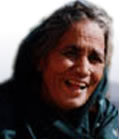 |
 |
||
 |
|||
| LOCAL THEMES agriculture communications community activities culture and customs development economics education employment and income environment environmental knowledge family life festivals food security forestry gender health justice and crime livelihood strategies livestock migration social change social institutions social relationships spiritual beliefs tourism traditional skills water BACKGROUND
OTHER LOCATIONS |
introducing the area
the themes
Many narrators approve of the new opportunities education should bring. Yet there is concern that in practice, young people often go to the cities for further study and then fail to return, leaving mountain farming to the less educated, the elderly - or the truly committed. This picture may seem somewhat bleak, but these interviews are exceptionally lively and interesting. They are not only rich in culture, knowledge and history but also in positive ideas on development and ways forward. Many people accept that past practices have to change as communities open up to wider social and economic influences, but they stress it is essential to take some of the strengths from the past and build on these as well. In particular, people advocate a return to some farming practices of the past, including cultivating traditional crops. Control over local resources and making the best use of them is a key issue. The interviews are full of stories of how big business and new roads have opened up forests, for example, to outsiders - and how poor policies have compounded the devastating effects of deforestation. A number of narrators are working on their own to turn unproductive pine plantations back to mixed forests, and several women have defied social norms to lead successful local anti-logging movements. Indeed, activism takes many forms in these interviews, and women initiate much of it. People's knowledge of the region's rich biodiversity is extensive. Sadly, many older people feel that their knowledge, based on accumulated experience rather than formal schooling, is gradually being undervalued as "bookish" knowledge predominates. Moreover, environmental changes mean that the variety of wild and cultivated plants as well as wildlife is indeed diminishing, and there is a real sense of urgency in their call for more environmentally aware development policies. Many factors, but notably education and the need for cash incomes, have greatly accelerated the trend for migration. The effects are wide-ranging, not least a decline in the old collective activities, in which everyone contributed to major works from house-building to maintenance of irrigation systems. Overall, though, the energy, wisdom and resourcefulness of the narrators, with their varied backgrounds and experiences, shines through their accounts. United in their connection to the mountains, they are full of ideas for the future. the partners
The Himalaya Trust (HT), a non-governmental rural development organisation based in Dehra Dun, has acted as a focal support point for the project. The main focus of HT's work is to restore the rapidly disappearing community forests, and protect biodiversity and water resources. It supports local initiatives and its programmes are implemented entirely by the communities themselves. The Himalaya Trust has also published Eternal Wisdom, a series of three Hindi booklets drawn from the interviews and edited by Indira Ramesh with Vir Singh and others, and illustrated by Soumen Chakravarty. The booklets cover biodiversity; gender; and traditional farming practices, and are an invaluable record of "a culture that celebrated the interdependency of man and nature". Together with some of the interviewers Indira Ramesh has also worked to take the oral testimony approach a stage further and develop a community radio project. As one interviewer pointed out: "80% of village people listen to the radio, yet they know nothing about what is happening in the neighbouring village 10-12kms away." The project aims to break down such isolation and stimulate discussion between and within villages.
publications
|
|||||||||||
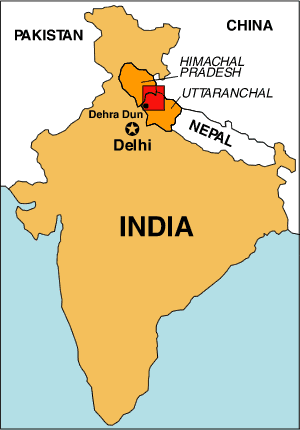
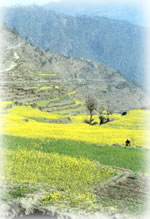 Although
the narrators inhabit a small area of such a vast range, their personal
stories touch on many of the development dilemmas that characterise
the region. Many narrators still live in villages some distance
away from the nearest road, yet none have remained untouched by
social, environmental and economic change, and many bear witness
to how dramatic those changes have been within one generation. The
impact of education and increased migration are key issues, as are
the effects of a changing natural environment, especially as a result
of deforestation, mono-culture forestry, the decline in traditional
agriculture, and large-scale infrastructure development, notably
road-building and the construction of the Tehri Dam.
Although
the narrators inhabit a small area of such a vast range, their personal
stories touch on many of the development dilemmas that characterise
the region. Many narrators still live in villages some distance
away from the nearest road, yet none have remained untouched by
social, environmental and economic change, and many bear witness
to how dramatic those changes have been within one generation. The
impact of education and increased migration are key issues, as are
the effects of a changing natural environment, especially as a result
of deforestation, mono-culture forestry, the decline in traditional
agriculture, and large-scale infrastructure development, notably
road-building and the construction of the Tehri Dam. 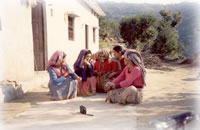 "This
is the age of transition,"
"This
is the age of transition,"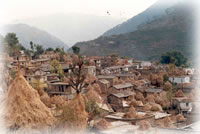 The
interviews were gathered between December 1993 and January 1999
over a wide area. The narrators come from different castes and although
most are Hindu, there are several Muslims and Buddhists. The dedicated
team of interviewers, drawn from different NGOs and professions,
was coordinated by Indira Ramesh, and consisted of Devendra Bahuguna,
Uma Bhatt, Anita Nautiyal, Kusum Rawat, Rajendra Bahuguna, Pratap
Singh Bisht, Khem Raj Mishra, Sadan Mishra, Ramila Negi, Opendra
Negi, Bandana Bisht and Pradeep Bahagana. Translation into English
was done by Anoop Mehta and Shagoon Rawat, with additional work
by Indira Ramesh, Padma, Manisha Chowdhery, Ramesh Gairola and Kusum
Nautiyal.
The
interviews were gathered between December 1993 and January 1999
over a wide area. The narrators come from different castes and although
most are Hindu, there are several Muslims and Buddhists. The dedicated
team of interviewers, drawn from different NGOs and professions,
was coordinated by Indira Ramesh, and consisted of Devendra Bahuguna,
Uma Bhatt, Anita Nautiyal, Kusum Rawat, Rajendra Bahuguna, Pratap
Singh Bisht, Khem Raj Mishra, Sadan Mishra, Ramila Negi, Opendra
Negi, Bandana Bisht and Pradeep Bahagana. Translation into English
was done by Anoop Mehta and Shagoon Rawat, with additional work
by Indira Ramesh, Padma, Manisha Chowdhery, Ramesh Gairola and Kusum
Nautiyal.

